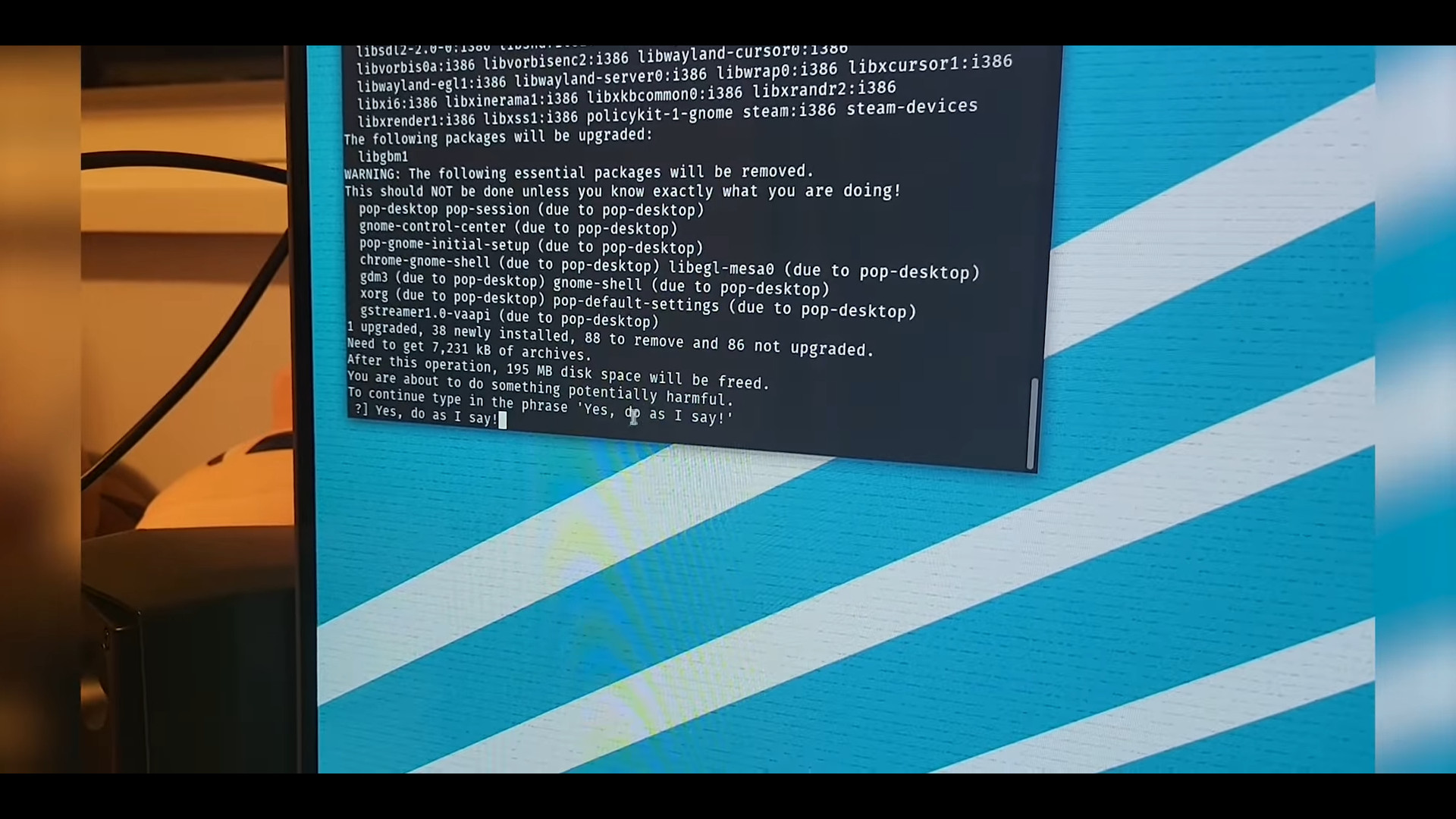After the issues that happened with Linus from Linus Tech Tips breaking Pop!_OS during the switch to Linux challenge, the APT package manager has been upgraded to prevent future issues happening.
We covered the problem in our previous article, where System76 were going to apply their own fix to prevent a dialogue appearing that allowed users to end up removing essential packages. At the same time, System76 were also talking with the APT team to get an official fix and one has now been created and released with APT 2.3.12.
The issue shouldn't have come up often, and was the result of the Steam package breaking, with APT in terminal mentioning lots of different things that could easily confuse users. To continue you needed to enter "Yes, do as I say!" to progress, which you should probably never do since the warning was there for a reason - essential packages being removed.

Picture Source: YouTube - oh dear.
Now, that option has been removed and APT will no longer have its solver attempt to remove essential or protected packages, so any dependency problem needs to be resolved manually. As a result your package won't install, remove or upgrade if there's conflicts but at least you have an actual working system. It can be overridden still but it won't tell you explicitly how to do so in the error messaging to prevent people just doing it anyway again.
Looks like Pop!_OS is already readying to bring in the changes. It's likely other distributions using APT will follow during their regular update patterns.
"Potentially harmful" doesn't really sound that bad. It also sounds vague, like the kind of message you get when the computer doesn't really know just what you're doing or whether it's actually going to do anything important, but is just putting in the boilerplate because the command generally has the potential to do serious things. Especially if you come from the Windows world, where I think the OS bitches every time you do anything other than browse the web with Microsoft Edge . . .
The more I read responses like this the more I think it was intentional. There's no way no one else has had this problem in years but a famous and technically knowleadgeable youtuber doing a live test session.
To use the terminal you need to read, it's a requirement. There's no NEXT button in the terminal, and anyone blindly copying and pasting text into the terminal and foolishly using the Intro key as a NEXT button in a Windows installer is doomed. If this is a bug, we should put an agreement request before the terminal opens to free the devs from responsibility, but then the user wouldn't read it neither. Looking at this like a bug it's unsolvable.
If you read "Potentially harmful" after a long text, and you have to type "Yes, do as I say", and after having tried and failed to install a package in the standard way, you should be wary that something worth of attention is happening. You just have to read a few more lines above to better understand what's happening or stop if you have no clue. But the messages were clear even for the newest users that could read. And thinking otherwise is really believing that Linus is an idiot, that he's not.
Last edited by berarma on 19 Nov 2021 at 6:47 pm UTC
"Potentially harmful" doesn't really sound that bad. It also sounds vague, like the kind of message you get when the computer doesn't really know just what you're doing or whether it's actually going to do anything important, but is just putting in the boilerplate because the command generally has the potential to do serious things. Especially if you come from the Windows world, where I think the OS bitches every time you do anything other than browse the web with Microsoft Edge . . .
The more I read responses like this the more I think it was intentional. There's no way no one else has had this problem in years but a famous and technically knowleadgeable youtuber doing a live test session.
To use the terminal you need to read, it's a requirement. There's no NEXT button in the terminal, and anyone blindly copying and pasting text into the terminal and foolishly using the Intro key as a NEXT button in a Windows installer is doomed. If this is a bug, we should put an agreement request before the terminal opens to free the devs from responsibility, but then the user wouldn't read it neither. Looking at this like a bug it's unsolvable.
If you read "Potentially harmful" after a long text, and you have to type "Yes, do as I say", and after having tried and failed to install a package in the standard way, you should be wary that something worth of attention is happening. You just have to read a few more lines above to better understand what's happening or stop if you have no clue. But the messages were clear even for the newest users that could read. And thinking otherwise is really believing that Linus is an idiot, that he's not.
Well there are the possibility that it was done deliberately to drive a thesis (Linux is difficult) and I accused Linus of such when it happened. But there is also the possibility that Linus was simply blinded by his Linux prejudice (you have to use the terminal in Linux to get anything done and the terminal is this magic obscure box).
That said, I think that many people in this thread should see this small clip from LTT that they released yesterday: [https://www.youtube.com/watch?v=_XHoNYJZPb4](https://www.youtube.com/watch?v=_XHoNYJZPb4) where they start to discuss that Windows is far from perfect and that they perhaps should have a part 6 where they try to approach a new Windows install as a noob and not as a hardened Windows veteran.
But what struck me as extremely funny from that clip is that Linus and Luke have earlier complained en masse on how Linux users always reply "well works for me" when they try to describe a problem that they have, and here the instant that Linus mentions that Windows is not perfect he gets a "well it works for me" type of reply in the chat that he reads out loud without really reflecting that this signifies that it's not Linux users that have the "it works for me", its computer people at large. Also the comment section is full of "it works for me" regarding Windows update, completely hilarious how oblivious the Windows users who earlier where so salty about Linux are about their own behaviour when Windows gets a tiny bit of scrutiny.
Linux and apt have been fine before they came along and breaking one's system is part of the learning experience and now there will be people who will be denied that.Oh no! How awful! They won't get to break their systems?! How could we deprive those poor people?
Here's a camp I am almost in: A computer is an appliance. I don't want a "learning experience" where I try to use my microwave oven and break it, I don't want it with my computer either.
Obviously, there are quite a few people, especially current Linux users, that that statement really doesn't work for. It doesn't apply to how they use, think about and work with computers.
But it's not wrong either, and I think some computer people need to be a little less purist and romantic about how their particular interest is the one that everyone in the world has to learn about.
So instead of package managers having to expect that their users will not read Warnings (which imo is ridiculous), I would say that the distros aimed at new users like Mint and Pop should include a message when running the Terminal (with the option to disable the message for future) that the Terminal is a high level tool and the user is expected to read and understand potential Warnings.So for people who don't read warnings, what you want is a warning, because that will surely make them read warnings.
Oh, come on. We know about this particular happening because it was a famous youtuber doing a live test session. Who knows how many trees fell in the forest but nobody was making a video of them?"Potentially harmful" doesn't really sound that bad. It also sounds vague, like the kind of message you get when the computer doesn't really know just what you're doing or whether it's actually going to do anything important, but is just putting in the boilerplate because the command generally has the potential to do serious things. Especially if you come from the Windows world, where I think the OS bitches every time you do anything other than browse the web with Microsoft Edge . . .
The more I read responses like this the more I think it was intentional. There's no way no one else has had this problem in years but a famous and technically knowleadgeable youtuber doing a live test session.
But it was also a somewhat freak occurrence--the package failed in such a way that doing a perfectly normal command was going to cause this (if you were somewhat overconfident in your approach). That is not normal, but non-normal things happen and this one did. The package really was that way, this was acknowledged. What do you figure, Linus bribed the packagers or the Pop!OS people to screw up the package so it would cause that error?
Terminals typically have clickable links. So inserting that into apt would not be a terrible idea. "Your package installation causes some conflicts which may render your system unusable. Click here $(link) for more details."That 'wall of text' ends with "you are about to remove essential packages, type exactly, 'Yes, I know what I'm doing' to continue."Those neon warning signs are there,
I think part of the problem was that there was no neon warning signs. The only warnings Linus got was an error from popshop that wasn't clear on what was happening... and a giant wall of text from apt.
Which is more than enough to say 'stop, you're about to do something horrendous to your system.' I have made many jokes before about not being able to do flashing red text in Confluence because of people not following the wiki... But really there are two things to blame here. 1) Linus being smart enough to be dangerous. 2) Linus not being patient enough to read the warning.
Since Linux distros wait for more users coming over from the Windows realm, package managers should expect users coming that have been trained to ignore most of the text that is beeing thrown at them during installation of software. For them it is almost unthinkable that the installation of a gaming software could uninstall parts of their OS.
So I think it's an improvement that such users now actively have to search for the command that can do harm, instead of being able to use it by just ignoring something.
I would love the error message being clickable (depending on the kind of error of course), linking the user to a site where he/she can read about and report problems and solutions with the package that led to the error.
It is totally apt's fault and I'm surprised that the Debian devs still left that option to nuke your system so easily. I'm kinda glad this happened because it is a reality check for System76 that they need to be more careful with their releases.I think the mistake that both Pop and Ubuntu do is that they don't fetch the latest packages during install. Debian's Network Install is fantastic as the installer is easy to use, and your first boot into the system will be fully up to date.
I agree with others that apt should do an update before installing any packages.
This is actually wrong. The UK has those huge sockets that can only work one way for electrical reaons (as far as I can tell), but other countries really don't. The US situation you describe is the norm, not the exception. This is alternating current, it'll work both ways because the current changes direction multiple times per second.That's true, I forgot about the reversible European plugs. Though looking at the Wikipedia page for plug and socket standards it still looks like non-reversible is the norm and reversible the exception globally. (If nothing else, the socket used in China is non-reversible.) But perhaps it wasn't the best example.
In Poland we have these grounded sockets/plugs that actually can be plugged in one way because there's a ground rod in the socket, though that is a limitation of the physical, not electrical, design. In neighbouring European countries they use almost the same plug but without the third rod and with two contacts on opposing sides of the plug and these can be put in every which way.
Linux and apt have been fine before they came along and breaking one's system is part of the learning experience and now there will be people who will be denied that.I mean, you can totally still break your system in any number of other ways. In fact you can still break your system in this exact way, it just takes one extra step. (And personally, I've yet to break my system in 7 years of using Linux and that's one "learning experience" I'm happy to continue avoiding.)
(And personally, I've yet to break my system in 7 years of using Linux and that's one "learning experience" I'm happy to continue avoiding.)There is a saying: The fool learns from his own mistakes. The wise man learns from the mistakes of others.
Perhaps you also blame the hammer when trying to hit a nail but instead hit your own thumb.
That 'wall of text' ends with "you are about to remove essential packages, type exactly, 'Yes, I know what I'm doing' to continue."Those neon warning signs are there,
I think part of the problem was that there was no neon warning signs. The only warnings Linus got was an error from popshop that wasn't clear on what was happening... and a giant wall of text from apt.
Which is more than enough to say 'stop, you're about to do something horrendous to your system.' I have made many jokes before about not being able to do flashing red text in Confluence because of people not following the wiki... But really there are two things to blame here. 1) Linus being smart enough to be dangerous. 2) Linus not being patient enough to read the warning.
Since Linux distros wait for more users coming over from the Windows realm, package managers should expect users coming that have been trained to ignore most of the text that is beeing thrown at them during installation of software. For them it is almost unthinkable that the installation of a gaming software could uninstall parts of their OS.
So I think it's an improvement that such users now actively have to search for the command that can do harm, instead of being able to use it by just ignoring something.
I would love the error message being clickable (depending on the kind of error of course), linking the user to a site where he/she can read about and report problems and solutions with the package that led to the error.
I say there are 2 issues here:
The first one 100% apt/Pop OS fault and that is that this should NEVER have happened during simple package installation, even if done from terminal.
But.. as anyone who worked with computers for a long time knows.. One of those things that should NEVER happen will eventually happen. Doesn't matter if you are on Linux, Mac or Windows. Which brings me to the second issue.
The second issue is 50% user fault and 50% Windows fault for training its users to be dumb and not read Warnings (yes even if it's a simple installation of package, user should be expected to read Warnings and Errors).
So instead of package managers having to expect that their users will not read Warnings (which imo is ridiculous), I would say that the distros aimed at new users like Mint and Pop should include a message when running the Terminal (with the option to disable the message for future) that the Terminal is a high level tool and the user is expected to read and understand potential Warnings.
In my opinion the ridiculous part here is that you need to have superuser rights to install a simple application.
There are people out there, who are something in between new users and geeks. They are people that want to use computers in a secure, private way. They don't want to mess with their OS more than nessessary. Most of them are now on Windows or Mac and not on Linux, for a reason..
I think distros like Mint and Pop are not primarily aimed at new users, but at those people, new users or not. And since Mint and Pop (and ...) don't stand in the way of more advanced users, they're good for those too.
So the question is: Do they find a way to welcome the users they're aimed at, without giving up certain principles?
Last edited by Nevertheless on 20 Nov 2021 at 11:05 am UTC
Apt is not a babysitter. It didn't even break his system. It was still working, it was just working in 'I have no Xorg anymore' mode. Which is a perfectly legitimate method of using Linux. :) It just was broken for what he was intending to do. It gave him ample warning that it was removing a bunch of crap. It's on the user to decide whether or not they want to remove all of that. He didn't even spend a second looking at it and just typed the 'yes, do as I say'. Also, has he seriously no clue that he shouldn't just copy / paste commands from random sites? That should be a known thing even for Windows users...2) Linus not being patient enough to read the warning.Most newbie users aren't that patient, especially when it comes to walls of text.
The point is that apt should not have allowed him to break his system in the first place. That should not have happened, and the fault is 10% on that Steam package... and 90% on apt.
You absolutely still have to have superuser rights to install Windows / Mac software too. Flatpak / Appimage / Snaps are different in this regard. While there are methods in Windows and Mac that software distributors can use to not require admin access, most of them don't bother. You still have a prompt that requires admin access to get past.That 'wall of text' ends with "you are about to remove essential packages, type exactly, 'Yes, I know what I'm doing' to continue."Those neon warning signs are there,
I think part of the problem was that there was no neon warning signs. The only warnings Linus got was an error from popshop that wasn't clear on what was happening... and a giant wall of text from apt.
Which is more than enough to say 'stop, you're about to do something horrendous to your system.' I have made many jokes before about not being able to do flashing red text in Confluence because of people not following the wiki... But really there are two things to blame here. 1) Linus being smart enough to be dangerous. 2) Linus not being patient enough to read the warning.
Since Linux distros wait for more users coming over from the Windows realm, package managers should expect users coming that have been trained to ignore most of the text that is beeing thrown at them during installation of software. For them it is almost unthinkable that the installation of a gaming software could uninstall parts of their OS.
So I think it's an improvement that such users now actively have to search for the command that can do harm, instead of being able to use it by just ignoring something.
I would love the error message being clickable (depending on the kind of error of course), linking the user to a site where he/she can read about and report problems and solutions with the package that led to the error.
I say there are 2 issues here:
The first one 100% apt/Pop OS fault and that is that this should NEVER have happened during simple package installation, even if done from terminal.
But.. as anyone who worked with computers for a long time knows.. One of those things that should NEVER happen will eventually happen. Doesn't matter if you are on Linux, Mac or Windows. Which brings me to the second issue.
The second issue is 50% user fault and 50% Windows fault for training its users to be dumb and not read Warnings (yes even if it's a simple installation of package, user should be expected to read Warnings and Errors).
So instead of package managers having to expect that their users will not read Warnings (which imo is ridiculous), I would say that the distros aimed at new users like Mint and Pop should include a message when running the Terminal (with the option to disable the message for future) that the Terminal is a high level tool and the user is expected to read and understand potential Warnings.
In my opinion the ridiculous part here is that you need to have superuser rights to install a simple application.
There are people out there, who are something in between new users and geeks. They are people that want to use computers in a secure, private way. They don't want to mess with their OS more than nessessary. Most of them are now on Windows or Mac and not on Linux, for a reason..
I think distros like Mint and Pop are not primarily aimed at new users, but at those people, new users or not. And since Mint and Pop (and ...) don't stand in the way of more advanced users, they're good for those too.
So the question is: Do they find a way to welcome the users they're aimed at, without giving up certain principles?
I don't know why it's ridiculous to expect people to know how to read... If you start up the terminal with 'OMG don't touch this unless you know what you're doing!!' do you think anyone would ever attempt to try playing with the terminal and learning something?
Ha, yeah I misquoted it as I was typing on my phone.I'm not sure what side I end up on in this, but I'd like to note that is not how it goes. The wall of text ends with "you are about to do something potentially harmful. To continue, type in the phrase". The mention of essential packages is eleven lines up from that part.That 'wall of text' ends with "you are about to remove essential packages, type exactly, 'Yes, I know what I'm doing' to continue."Those neon warning signs are there,
I think part of the problem was that there was no neon warning signs. The only warnings Linus got was an error from popshop that wasn't clear on what was happening... and a giant wall of text from apt.
"Potentially harmful" doesn't really sound that bad. It also sounds vague, like the kind of message you get when the computer doesn't really know just what you're doing or whether it's actually going to do anything important, but is just putting in the boilerplate because the command generally has the potential to do serious things. Especially if you come from the Windows world, where I think the OS bitches every time you do anything other than browse the web with Microsoft Edge . . .
It's accurate to say potentially harmful, as the system is still perfectly fine without Xorg.. just not for his requirements of having a desktop / playing games. :P
So instead of package managers having to expect that their users will not read Warnings (which imo is ridiculous), I would say that the distros aimed at new users like Mint and Pop should include a message when running the Terminal (with the option to disable the message for future) that the Terminal is a high level tool and the user is expected to read and understand potential Warnings.So for people who don't read warnings, what you want is a warning, because that will surely make them read warnings.
Shit, that's a good point. Well then the only way for them to learn to read them is the hard way. Like Linus did.
Apt is not a babysitter. It didn't even break his system. It was still working, it was just working in 'I have no Xorg anymore' mode. Which is a perfectly legitimate method of using Linux. :) It just was broken for what he was intending to do. It gave him ample warning that it was removing a bunch of crap. It's on the user to decide whether or not they want to remove all of that. He didn't even spend a second looking at it and just typed the 'yes, do as I say'. Also, has he seriously no clue that he shouldn't just copy / paste commands from random sites? That should be a known thing even for Windows users...2) Linus not being patient enough to read the warning.Most newbie users aren't that patient, especially when it comes to walls of text.
The point is that apt should not have allowed him to break his system in the first place. That should not have happened, and the fault is 10% on that Steam package... and 90% on apt.
Would it have even been broken for what he was intending to do? It's been a loooong while since I even had to look, but wouldn't he have had XOrg back with a simple...
apt install xorgThat said... at the time, there still would have been Pop_OS!'s bug with the Steam package, so Linus still wouldn't have been able to get Steam (easily).
As a library person I learned the hard way over many years: Nobody reads the signs.So instead of package managers having to expect that their users will not read Warnings (which imo is ridiculous), I would say that the distros aimed at new users like Mint and Pop should include a message when running the Terminal (with the option to disable the message for future) that the Terminal is a high level tool and the user is expected to read and understand potential Warnings.So for people who don't read warnings, what you want is a warning, because that will surely make them read warnings.
Shit, that's a good point. Well then the only way for them to learn to read them is the hard way. Like Linus did.
But I mean... to truly remember something, you need to bleed a little. Like I certainly won't try to force my blinds on my back sliding glass door again after I cut myself on the sharp metal...(And personally, I've yet to break my system in 7 years of using Linux and that's one "learning experience" I'm happy to continue avoiding.)There is a saying: The fool learns from his own mistakes. The wise man learns from the mistakes of others.
Then again, I also believe you don't truly own your computer until you've bled inside it :P










 How to set, change and reset your SteamOS / Steam Deck desktop sudo password
How to set, change and reset your SteamOS / Steam Deck desktop sudo password How to set up Decky Loader on Steam Deck / SteamOS for easy plugins
How to set up Decky Loader on Steam Deck / SteamOS for easy plugins
See more from me